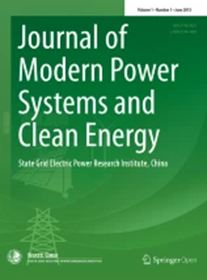垂变控制孤岛式微电网中电动汽车充电的无通信管理策略
IF 5.7
1区 工程技术
Q1 ENGINEERING, ELECTRICAL & ELECTRONIC
Journal of Modern Power Systems and Clean Energy
Pub Date : 2024-01-16
DOI:10.35833/MPCE.2023.000234
引用次数: 0
摘要
电动汽车(EV)的高普及率要求实施适当的充电管理系统,以减轻其对配电网络的负面影响。目前,大多数建议的电动汽车充电管理技术都依赖于高带宽通信链路的可用性。这些技术远未实现,原因包括:①在许多情况下,如电动汽车连接的二次(低压)配电系统、农村地区、偏远社区和岛屿,缺乏公用事业级通信系统;②目前人们对电动汽车用户数据隐私和网络物理安全的担忧和顾虑。针对这些情况,需要适当的本地控制方案,以确保在不违反电网运行要求的情况下对电动汽车充电进行适当管理。因此,本文介绍了一种新的无通信管理策略,用于在凋落控制孤岛微电网中为电动汽车充电。所提出的策略是自主的,因为它基于对系统频率和本地母线电压的测量。在微电网分布式发电机(DG)供不应求的情况下,所提出的策略将更多的系统容量分配给过去充电较少的电动汽车,从而实施社会充电公平政策。此外,该管理策略还采用了一种新颖的无通信电动汽车甩负荷方案,以便在高负载或分布式发电机停机等因素导致严重欠压或欠频时为微电网提供缓解。数值模拟证明,在调节电动汽车充电需求以应对微电网不稳定性方面,建议的策略优于最先进的控制器。本文章由计算机程序翻译,如有差异,请以英文原文为准。
Communication-Less Management Strategy for Electric Vehicle Charging in Droop-Controlled Islanded Microgrids
Adopting high penetration levels of electric vehicles (EVs) necessitates the implementation of appropriate charging management systems to mitigate their negative impacts on power distribution networks. Currently, most of the proposed EV charging management techniques rely on the availability of high-bandwidth communication links. Such techniques are far from realization due to ① the lack of utility-grade communication systems in many cases such as secondary (low-voltage) power distribution systems to which EVs are connected, rural areas, remote communities, and islands, and ② existing fears and concerns about the data privacy of EV users and cyber-physical security. For these cases, appropriate local control schemes are needed to ensure the adequate management of EV charging without violating the grid operation requirements. Accordingly, this paper introduces a new communication-less management strategy for EV charging in droop-controlled islanded microgrids. The proposed strategy is autonomous, as it is based on the measurement of system frequency and local bus voltages. The proposed strategy implements a social charging fairness policy during periods when the microgrid distributed generators (DGs) are in short supply by allocating more system capacity to the EVs with less charging in the past. Furthermore, a novel communication-less EV load shedding scheme is incorporated into the management strategy to provide relief to the microgrid during events of severe undervoltage or underfrequency occurrences due to factors such as high loading or DG outages. Numerical simulations demonstrate the superiority of the proposed strategy over the state-of-the-art controllers in modulating the EV charging demand to counteract microgrid instability.
求助全文
通过发布文献求助,成功后即可免费获取论文全文。
去求助
来源期刊

Journal of Modern Power Systems and Clean Energy
ENGINEERING, ELECTRICAL & ELECTRONIC-
CiteScore
12.30
自引率
14.30%
发文量
97
审稿时长
13 weeks
期刊介绍:
Journal of Modern Power Systems and Clean Energy (MPCE), commencing from June, 2013, is a newly established, peer-reviewed and quarterly published journal in English. It is the first international power engineering journal originated in mainland China. MPCE publishes original papers, short letters and review articles in the field of modern power systems with focus on smart grid technology and renewable energy integration, etc.
 求助内容:
求助内容: 应助结果提醒方式:
应助结果提醒方式:


